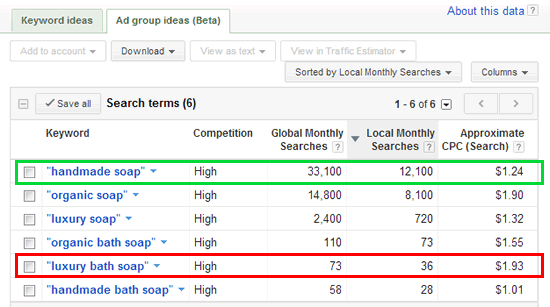3 Reasons Why Keyword Optimization Still Matters
We small business owners are constantly trying to reach new customers online. And if you’re like most of us, you have a nagging feeling that you need to do something about your web site SEO. You’ve probably heard that you need to perform “keyword optimization”, whatever that means. And you may have heard conflicting opinions about how much all this matters to Google today, and if it will still matter to Google tomorrow.

Keyword optimization means aligning the presentation of your online products and services to what your ideal customers are searching for.
Sometimes our ideal customers are searching for our product or service with their wallets out. And that’s when we want our small business web sites to show up at the top of Google’s organic rankings. Right?
Here are 3 reasons why keyword optimization still matters and will continue to matter.
1) Keyword optimization helps us better understand our target markets
Keyword optimization begins with keyword research. By performing broad and creative keyword research, and applying filters that make sense for your small business, you will learn a tremendous amount about what your ideal customers are searching for online.
“The aim of marketing is to know and understand the customer so well the product or service fits him and sells itself.” (Peter Drucker)
When it comes to performing effective marketing, we are often too close to our own business and offerings for our own good. We might have our own jargon and nomenclature that our customers don’t share. We might think we’re addressing one set of needs when in fact there is a greater opportunity to address different needs. Effective keyword research clarifies all of this.
Example
Let’s say we’re about to launch our new small business to sell our “luxury bath soaps” online. You know there’s demand for such products due to the popularity of stores like L’Occitane, Lush, Bath and Body Works and many others.
So you design your web site around your “luxury bath soap” concept, launch it, build authority through high-value links from related sites and blogs, and get all the way to page 1 of Google for the keyword “luxury bath soap”. Congratulations!
There’s just one problem. You’re only getting two visitors a month through organic Google searches. What happened???
You failed to do your research. A quick check of the Google Adwords Keyword Tool shows us that there are only 36 monthly searches throughout the entire U.S. for the phrase “luxury bath soap”.
Oops! That’s not much of a market!
The keyword “luxury soap” is a bit better, but still has very low traffic. “Organic soap” has significant search traffic and could be a valuable keyword for you if it applies. “Handmade soap” gets very high search traffic (12,100 per month) and might yield pretty much the same customers who would be attracted to “luxury bath soap”.

There’s much more work to be done than a quick Keyword Tool search in order to determine which keywords will help you best reach your target customers in a market of reasonable size and accessibility. You need to consider competition, among other factors.
But it’s safe to say that getting near the top of Google search results for a keyword with thousands of monthly searches will yield better business results than achieving the #1 Google ranking for a keyword with negligible search traffic.
Keyword research provides essential insights into what customer search terms will yield high traffic, low competition, and high commercial value.
You want to understand this essential data about the target customers for your small business, don’t you?
Learn how to perform efficient and effective keyword research for your small business.
2) Keyword optimization helps us make our web sites more customer-focused
Your small business web site is a marketing tool. What is your strategy for structuring your web site and writing engaging page copy that speaks to the needs of your target customers?
Your strategy had better take into account your keyword research, which tells you what your online customers most care about through their search patterns.
To create engaged site visitors, you need their Google search phrases to align with:
- The phrases they see in your Google search result listing
- The phrases they see on the landing page they reach by clicking on your listing
This alignment brings you new visitors and gets them to spend time on your site. Both pieces are essential for eventually turning new visitors into new customers.
Example
Continuing our example from above, let’s say you’ve only partially optimized your site for “handmade soap”. What happens if someone types “handmade soap” into Google, finds and clicks on your search listing, and then lands on your home page which is all about “luxury bath soaps”?
- They may be confused
- They may feel like you’ve mis-led them
- They will be much more likely to hit the dreaded “Back” button
Perhaps your product would actually be perfect for them. It doesn’t matter. We are incredibly impatient online. New site visitors will take less than 5 seconds to decide whether to commit to spending more time on your site or look elsewhere. Don’t risk confusing them.
Further, your keyword research will help guide your site architecture. Perhaps your home page focuses on “homemade soap” and you have category pages that focus on “organic soap”, “lavendar soap”, etc., because you’ve determined through your research that those keywords have high value.
Keyword optimization for your web site means organizing the presentation of your products and services to best serve your ideal customers.
You can either make a conscious effort to do this, or you can guess. Do you really want the online success of your small business to be based on guesswork?
3) Keyword optimization enables Google to showcase our sites for the most relevant searches
You’ve probably been warned about things like “keyword stuffing” and focusing on “keyword density” and how those things can hurt more than help with search engines these days. And that’s true. Search engines care about one thing — showing great content to users (else users will stop using them!).
So Google and others have become very good about separating the wheat from the chaff. Most “black hat SEO” techniques will fail miserably these days.
However, this doesn’t mean you should avoid thinking about keyword optimization!
There are two primary ways that search engines determine what your site is about:
- By reading the text on your web site pages
- By reading the text in links from other web sites that point to your web site
(Use this handy free tool to see exactly how your site pages look to search engines.)
Note that #1 is completely within your control, while #2 is heavily influenced by the choices you make for #1.
In both cases, it’s the keywords on your site that matter.
Example
Continuing our example, what happens if your site messaging is all about “luxury bath soaps”? And if other sites that link to you also, quite naturally, use “luxury bath soaps” in the link anchor text?
Will Google figure out for you that all those thousands of people searching for “handmade soap” could be fantastic customers for you? Don’t bet on it!
Help Google and help yourself. Optimize your site for the most relevant and high-value keywords for your small business.
Keyword optimization, at its core, means effectively using the most compelling words for accurately describing what your web site has to offer to your target customers.
If you don’t have a keyword strategy for your small business web site, then you probably don’t have an effective marketing strategy. And your site probably lacks focus and clarity. And you’ll deserve to be buried on page 20 of Google search results!
IMPORTANT NOTE: Keyword optimization for your web site is a necessary but not sufficient requirement for achieving top Google rankings. Your site also needs a competitive level of site authority. Search engines gauge authority primarily by the number and quality of links pointing to your site from other sites, as well as from social signals (Facebook shares, Tweets) and other less important data. I’ll cover how to build authority in another post.
Conclusion
I’ve demonstrated why keyword optimization is essential for understanding, reaching and engaging our target customers for our small businesses.
Now that we all agree, how do we go about performing effective and efficient keyword research?
I cover keyword research in glorious detail in this blog post.
How important have you found keyword optimization to be for small business owners?


Great article Andrew! Keyword research is definitely the most important step in any web-related project. Thanks for outlining why it is so critical for our customers.
Thanks, Tammy.
I think a lot of folks try to take shortcuts here. But, ultimately, either you do your research up front and design your web site optimally the first time, or you do the research later when you’re frustrated by a lack of valuable traffic and then try to shoehorn the results into a non-optimal site structure.
Reminds me of the saying, “There’s never time to do it right, but there’s always time to do it over.”
I hope more small business owners take the time to do it right!